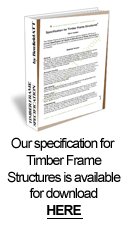Timber Frame House Design DIY Guide
We hope these simple tips will help you on your way to designing your dream home and creating your own house plans.
You can download these tips as a FREE pdf guide by clicking here

Trying Out a Modern Architectural Software Package
Timber frame house design can be made simpler by trying out one of the many house design software packages available today. Prices have dropped considerably over the years for this type of software, and the skills required to use them have become easier to learn. Now, anyone with the patience to learn them can achieve quite impressive results in a few hours. Additionally, most of these software packages offer 3D views of your home design, helping you to really convey how you want your dream home, renovations, or extension to look.
Using Simple Old Fashioned, Pencil and Paper!
If talk about computer aided design (CAD) software seems daunting, simply just try sketching your home with good, old fashioned pencil and paper. We have provided "How to Design Your Dream Home" guidelines below.
Your Guide to Design - a Starting Point
If you are considering designing your home from scratch, or making alterations to any of our standard home designs, please keep in mind the following information. If you use this guide to help you create a VERY rough preliminary sketch or doodle, this will provide us with a starting point to help us better understand your thoughts and house design ideas .

1. Begin with your 'Bubble' design...
On a blank piece of paper, mark North, South, East, and West along the four sides. Then draw bubble shapes for all the major living spaces. Identify each room e.g. "K" for kitchen, "B" for bathroom, "Bed" for bedroom, "L" for living room, "C" for Conservatory, "S" for Sun Lounge, "U" for utility room, "D" for dining room, etc.. Now play around with the 'bubble' shapes. With this 'bubble' technique you can create a very good sketch of the relationship you want between the different spaces in your new dream home. It can help if you also think about which direction you would like these living spaces to face. For example , if you want the morning sunrise to stream into your kitchen it should have windows that face towards the east.

2. Now change those bubbles...
When you have a good idea of how you want all of the living spaces in your home to interrelate with one another, change your 'bubbles' so that they are more representative of your dream home's floor plans. Take some time to look over some of our pattern book example home plans. Let these give you a better understanding of how each floor is meant to look. Don't worry too much about the dimensions, so long as the rooms look reasonably in proportion to each other.

3. Now write in the sizes you want...
Now you have something resembling a rough floor plan and its time to mark on some of sizes you'd like your rooms to be. You should also indicate the location and size of windows, French doors, patio doors, and external doors that you want to be included. It is not necessary to mark on every measurement, just the widths and depths will suffice. However, do make sure you write in the overall width and depth of each floor. This is also a good time to do a rough sketch of how you would like each timberframe elevation to look.
What To Do Next
Send us your rough floor plans - and elevations if you have sketched them out - together with any other information, like plot width, plot depth, land slopes, and surrounding properties, and photo's of the site and, or buildings on it, that you may have for a FREE estimate.







